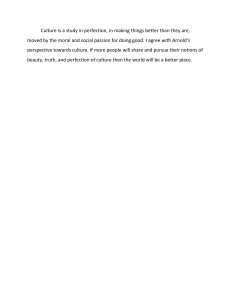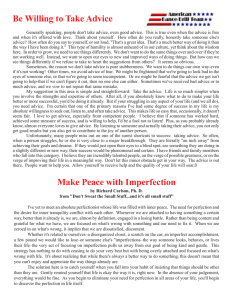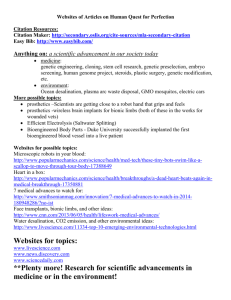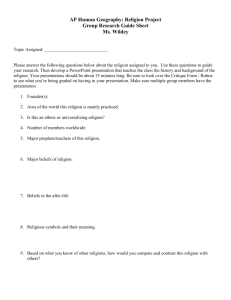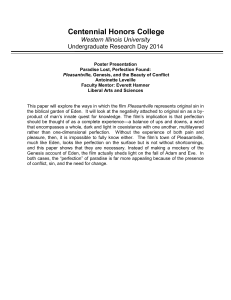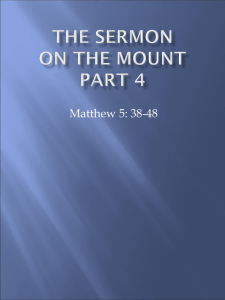Definitions of Culture
advertisement
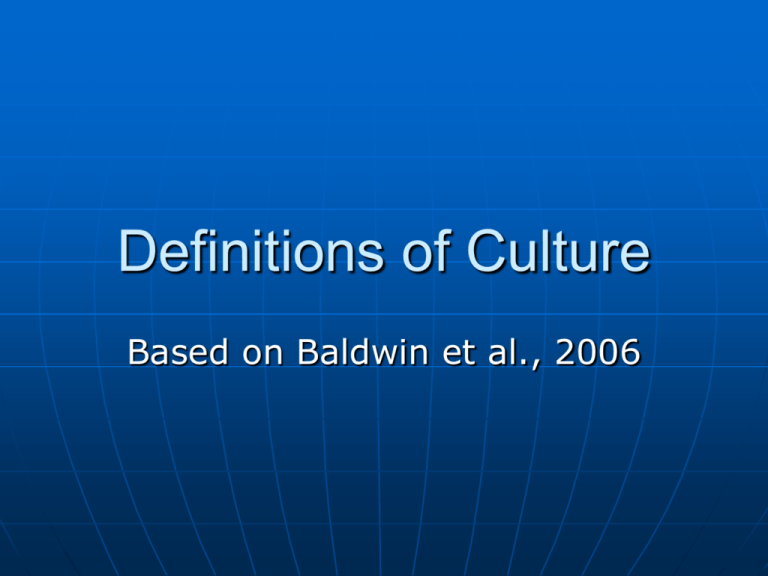
Definitions of Culture Based on Baldwin et al., 2006 Reviewing Time Capsule http://esl.fis.edu/teachers/support/culture.htm A “Typical” Definition Culture: “The deposit of knowledge, experience, beliefs, values, attitudes, meanings, hierarchies, religion, notions of time, roles, spatial relations, concepts of the universe, and material objects and possessions acquired by a group of people in the course of generations through individual and group striving” (Samovar & Porter, 2003, p. 8) New View(s) of Culture Structure: pattern, way of life, system of something • Beliefs, attitudes, thoughts • Symbols • “Laundry list”: artifacts, concepts, behaviors Function: purpose, in order to, end Process: dynamic, ongoing Critical: power relations, etc. And others… Structural Definition “An historically transmitted pattern of meaning embodied in symbols, a system of inherited conceptions expressed in symbolic forms” (Geertz, 1973, p. 89) “The term culture usually is reserved to refer to the systems of knowledge used by relatively large numbers of people” [i.e., national groups] (Gudykunst & Kim, 2003, p. 17) Functional Definition “Culture, apart from its primary function of active adaptation to the environment, has another, derivative, but no less important, function as an exact material and spiritual environment which mediates and reflects the human collecties and among them.” (Tokarev, 1973, pp. 167-168) Process Definition “Culture is to be studied not so much as a system of kinship, or a collection of artifacts, or as a corpus of myths, but as sense-making, as a reality constructed and displayed by those whose existence is embedded in a particular set of webs [of meaning].” (Pacanowsky & O’Donnell-Trujillo, 1982, p. 123) “Power” (Critical) Definition “Culture functions as an ideology that produces or is based upon a type of false consciousness and works to oppress a group of people; and there is generally an imperative for change that is accomplished, to one degree or another, through the formation of a critical and/or class consciousness.” (Allen, 1998, p. 100) Postmodern Definition “Culture, and our views of ‘it,’ are produced historically, and re actively contested. There is no whole picture that can be ‘filled in,’ since the perception and filling of a gap lead to the awareness of other gaps. . . Culture is contested, temporal, and emergent” (Clifford, 1986, pp. 1819) Other Definitions Culture as product: “material culture” or “popular culture” versus “high” culture or “folk” culture Culture as refinement: moral or intellectual development, human attainment of “perfection” Culture as group: the people who share whatever culture is. Your turn! Culture “begins with the way that [religious beliefs, communal rituals, or shared traditions] are produced through systems of meaning, through structures of power….It is impossible to think of culture as a finite and self-sufficient body of contents, customs, and traditions” (Donald & Rattansi, 1992, p. 4) “Culture is the moral and social passion for doing good. It is the study and pursuit of perfection, and this perfection is the growth and predominance of humanity proper, as distinguished from our animality” (Harrison, 1971, p. 270). “Culture is simply a way of talking about collective identities” (Kuper, 1999, p. 3) “Culture is synonymous with civilization, and therefore only the civilized have culture. . . Culture, as a guidance system, leads us to notice important differences between humans and other phenomena that get directed” (Freilich, 1989, pp. 3, 10) “Culture is . . . clearly derived from what people do. . . It is this complex of ongoing activity that establishes and portrays structure of organization” (Blumer, 1969, pp. 67) “The culture of everyday life is a culture of concrete practices which embody and perform differences. These embodied differences are a site of struggle between the measured individuals that constitute social discipline, and the popularityproduced differences that fill and extend the spaces and power of the people” (Fiske, 1992, p. 162) “The culture of a people consists not only of its concrete creations—tools, buildings, and so on are its “material culture”—but of all the patterns of interaction, all the formal and informal rules of behavior which have become traditional in the relations between social groups” (Martin, 1970, p. 15) “The term culture is multi-discursive; it can be mobilized in a number of different discourses. This means you cannot import a fixed definition into any and every context and expect it to make sense.” (O’Sullivan et al., 1983, p. 57) Other Important Terms “Race” Ethnicity Subculture/Co-culture Group (in-group, out-group) • “wannabes” • Who defines? Terms in the Study of ICC “Cultural” communication “Cross-cultural” communication “Intercultural” communication International communication • Media • Development
